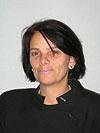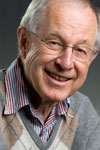Jenny Thomas named new MINOS co-spokesperson
 |
| Jenny ThomasImage courtesy of STFC. |
Members of the MINOS collaboration have selected Jenny Thomas, a professor at University College London and current MINOS deputy co-spokesperson, as the next co-spokesperson for the experiment. Thomas replaced Stan Wojcicki, from Stanford University, in the role beginning January 1. She serves as co-spokesperson alongside Rob Plunkett, a Fermilab scientist.
"Jenny is one of the founding members of this collaboration and very qualified to serve as a spokesperson," Wojcicki said. "She's played a very major role in the experiment. Jenny is very versatile, personal and gets along with people really well. She isn't afraid to speak her opinions, but she hears other people as well."
Thomas feels well-prepared for the position, thanks in part to Wojcicki, whom she credits as a role model.
"Stan has always managed to get consensus at the hardest of times. I hope I can continue with that record," Thomas said.
Thomas began her career as a graduate student at DESY. She then worked on the ALEPH experiment at CERN, at the Superconducting Super Collider with the GEM collaboration and then on MINOS as a Fermilab employee before moving back to London, where she is currently based.
MINOS, which stands for Main Injector Neutrino Oscillation Search, observes the phenomenon of neutrino oscillations. A beam of neutrinos is sent through a detector at Fermilab to a detector in Minnesota, where scientists study how neutrinos change into a different type in transit.
 |
| Stan Wojcicki |
Wojcicki has been the MINOS spokesperson for the past 15 years, since the beginning of the collaboration. He plans to continue to work on MINOS and will dedicate more time to hands-on research and analysis. He also plans to be more active on the NOvA neutrino experiment and the laboratory's proposed Project X.
Wojcicki felt that now is a good time to transition out of the leadership role and let younger collaborators take over. Experimenters expect the MINOS experiment to take data at least through 2011. Until then, the experiment will run part of the time in antineutrino mode, the opposite of what it has done during the previous years. The collaboration will continue to analyze data from the current and previous runs for several years after the current run ends.
Thomas said she feels fortunate to step into the role at such a high point.
"Right now, we're the premier neutrino experiment in the world. We're at the peak of our productivity and we're taking data and doing analysis," she said. "We're on top of the field."
-- Rhianna Wisniewski
|